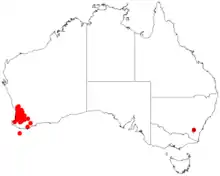Acacia celastrifolia
Acacia celastrifolia, commonly known as the glowing wattle,[1] is a shrub or tree belonging to the genus Acacia and the subgenus Phyllodineae native to Western Australia.
| Glowing wattle | |
|---|---|
.jpg.webp) | |
| Scientific classification | |
| Kingdom: | Plantae |
| Clade: | Tracheophytes |
| Clade: | Angiosperms |
| Clade: | Eudicots |
| Clade: | Rosids |
| Order: | Fabales |
| Family: | Fabaceae |
| Clade: | Mimosoideae |
| Genus: | Acacia |
| Species: | A. celastrifolia |
| Binomial name | |
| Acacia celastrifolia | |
 | |
| Occurrence data from AVH | |
The bushy shrub or tree typically grows to a height of 1 to 3 metres (3 to 10 ft).[2] It has phyllodes that are 2 to 6 centimetres (0.8 to 2.4 in) in length and 5 to 25 mm (0.20 to 0.98 in) wide with prominent central and marginal nerves.[1] Each phyllode has an obovate to oblanceolate or elliptic shape.[3] It blooms from April to August and produces yellow flowers.[2] The inflorescences are composed of a raceme with 10 to 20 heads over a length of 3 to 12 centimetres (1.2 to 4.7 in) with globular heads containing two to three bright golden flowers. Erect, linear, woody and straight to shallowly curved seed pods form after flowering and are to around 12 cm (4.7 in) long and 3 to 4 millimetres (0.118 to 0.157 in) wide. The oblong glossy brown seeds within are 4 to 5 millimetres (0.157 to 0.197 in) in length.[3]
A. celastrifolis is part of the Acacia myrtifolia group and is also closely related to Acacia clydonophora.[3]
It is native to an area along in the South West and the Wheatbelt regions of Western Australia.[2] It is found growing in sandy to gravelly lateritic or granitic soils amongst woodland or kwongan[1] or on laterite hills as part of Eucalyptus (often Eucalyptus accedens) woodland communities.[3]
.jpg.webp)
See also
References
- Margaret G. Corrick, Bruce Alexander Fuhrer (2009). Wildflowers of Southern Western Australia. Rosenburg Publishing. ISBN 9781877058844.
- "Acacia celastrifolia". FloraBase. Western Australian Government Department of Parks and Wildlife.
- "Acacia celastrifolia". World Wide Wattle. Western Australian Herbarium. Retrieved 7 September 2018.